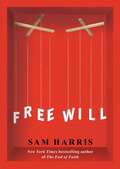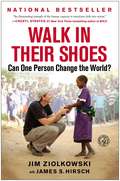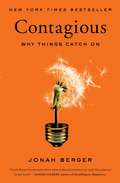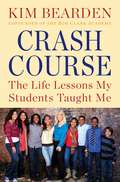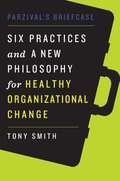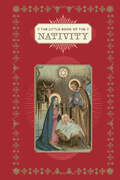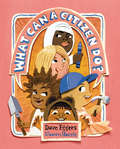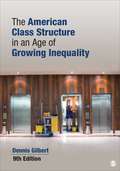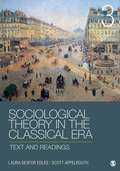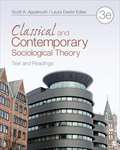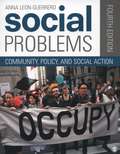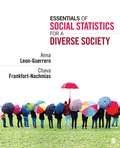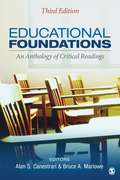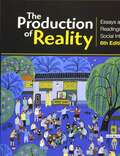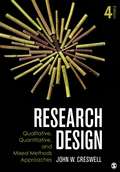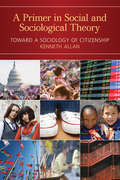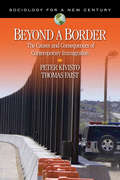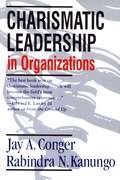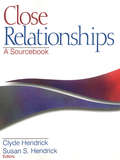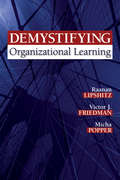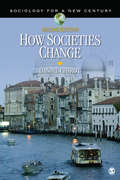- Table View
- List View
Free Will
by Sam HarrisFrom the New York Times bestselling author of The End of Faith, a thought-provoking, "brilliant and witty" (Oliver Sacks) look at the notion of free will—and the implications that it is an illusion.A belief in free will touches nearly everything that human beings value. It is difficult to think about law, politics, religion, public policy, intimate relationships, morality—as well as feelings of remorse or personal achievement—without first imagining that every person is the true source of his or her thoughts and actions. And yet the facts tell us that free will is an illusion. In this enlightening book, Sam Harris argues that this truth about the human mind does not undermine morality or diminish the importance of social and political freedom, but it can and should change the way we think about some of the most important questions in life.
Walk in Their Shoes
by James S Hirsch Jim ZiolkowskiThe powerful, personal story of Jim Ziolkowski, the man behind the organization buildOn--which turns inner city teens into community leaders at home and abroad--and his inspiring mission to change the world one community at a time.Jim Ziolkowski gave up his career in corporate finance to create buildOn, a service-oriented program that goes into high-risk areas around the world to work with students in their communities. Under Jim's leadership, buildOn volunteers have contributed more than 850,000 hours of community service, and the organization has constructed more than 430 schools worldwide, from the South Bronx, to Detroit, Chicago, and Oakland, to Haiti, Senegal, Nicaragua, and Nepal. Walk in Their Shoes is packed with the ingredients of a powerful bestseller as it traces Jim's story from his transformation from a thrill-seeking twenty-something backpacker, to a Harlem-based idealist trying to launch a not-for-profit organization, and finally to the head of buildOn. Ziolkowski compellingly chronicles his exciting story of worldwide travel and adventure, creating a moving portrait of the power of faith, teamwork, and the boundless potential of the human spirit. Blessed with relentless optimism and an unshakable faith, both of which have fortified his commitment to the poor and the underprivileged, Jim Ziolkowski's inspirational memoir reveals that helping and empathizing with others can help--and heal--ourselves.
Walk in Their Shoes: Can One Person Change the World?
by James S. Hirsch Jim ZiolkowskiJim Ziolkowski gave up his career in corporate finance to create buildOn, a service-oriented program that goes into high-risk areas around the world to work with students in their communities. Under Jim's leadership, buildOn volunteers have contributed more than 850,000 hours of community service, and the organization has constructed more than 430 schools worldwide, from the South Bronx, to Detroit, Chicago, and Oakland, to Haiti, Senegal, Nicaragua, and Nepal.Walk in Their Shoes is packed with the ingredients of a powerful bestseller as it traces Jim's story from his transformation from a thrill-seeking twenty-something backpacker, to a Harlem-based idealist trying to launch a not-for-profit organization, and finally to the head of buildOn.Ziolkowski compellingly chronicles his exciting story of worldwide travel and adventure, creating a moving portrait of the power of faith, teamwork, and the boundless potential of the human spirit. Blessed with relentless optimism and an unshakable faith, both of which have fortified his commitment to the poor and the underprivileged, Jim Ziolkowski's inspirational memoir reveals that helping and empathizing with others can help--and heal--ourselves.
Contagious: Why Things Catch On
by Jonah Berger<P>What makes things popular? If you said advertising, think again. People don't listen to advertisements, they listen to their peers. But why do people talk about certain products and ideas more than others? Why are some stories and rumors more infectious? And what makes online content go viral? <P> Wharton marketing professor Jonah Berger has spent the last decade answering these questions. He's studied why New York Times articles make the paper's own Most E-mailed List, why products get word of mouth, and how social influence shapes everything from the cars we buy to the clothes we wear to the names we give our children. In this book, Berger reveals the secret science behind word-of-mouth and social transmission. Discover how six basic principles drive all sorts of things to become contagious, from consumer products and policy initiatives to workplace rumors and YouTube videos. <P>Contagious combines groundbreaking research with powerful stories. Learn how a luxury steakhouse found popularity through the lowly cheese-steak, why anti-drug commercials might have actually increased drug use, and why more than 200 million consumers shared a video about one of the seemingly most boring products there is: a blender. If you've wondered why certain stories get shared, e-mails get forwarded, or videos go viral, Contagious explains why, and shows how to leverage these concepts to craft contagious content. <P>This book provides a set of specific, actionable techniques for helping information spread--for designing messages, advertisements, and information that people will share. Whether you're a manager at a big company, a small business owner trying to boost awareness, a politician running for office, or a health official trying to get the word out, Contagious will show you how to make your product or idea catch on. <P><b>A New York Times Bestseller</b>
Crash Course: The Life Lessons My Students Taught Me
by Kim BeardenThe inspiring true story of a teacher’s experiences with her students and the life lessons she learned that can help others find joy and success.<P> Crash Course chronicles the life lessons that Kim Bearden has learned during an award-winning career in education that has spanned three decades. Kim has taught more than 2,000 students, and each has shown her something about the world and the abundant capacity for love, resilience, and appreciation that we all possess. By sharing her students’ stories, she teaches their inspiring lessons to us all.<P> Throughout the ups and downs of her professional and personal life, Kim found that her students were the light that illuminated her path; they were her sanctuary in the storm. From her challenges as a first year teacher, to her triumphs as the cofounder of the highly acclaimed Ron Clark Academy, Kim shares how children can teach each of us the importance of building relationships, abandoning fear, embracing one’s unique gifts, and living with passion.<P> Full of honesty, humor, heartbreak, and humanity, Kim’s experiences show how children can help any one of us, despite life’s obstacles, find the joy and significance in both our personal and professional lives.
Algeria: Statistical Appendix
by International Monetary FundA report from the International Monetary Fund.
You Can Wear It Again: A Celebration of Bridesmaids' Dresses
by Meg Mateo IlascoExplore fifty years of bridesmaid fashion in this stunning retrospective featuring real-life wedding photographs. Being a bridesmaid is one of the greatest honors a dear friend can bestow. But wearing the dress the bride picks out? That&’s the true test of friendship. You Can Wear It Again pays loving tribute to fifty years of bridesmaids&’ dresses, as featured in real-life weddings. The product of both fashion trends and the bride's whims, bridesmaids&’ dresses may take the form of medieval costume, complete with wimple; slip dresses with real feathered wings to transform maids into true angels; or the ruffled peach taffeta with puff sleeves that so dominated the 1980s. Whatever the look, you can be sure it&’s been in and out of fashion more than once. Some lessons are never learned. The perfect gift for current and former bridesmaids, You Can Wear It Again isn&’t just a showcase of bridal fashions, but a testament to the selfless women everywhere who help the bride&’s dreams come true.
Parzival's Briefcase
by Tony SmithEveryone talks about the need to restructure organizations to meet new challenges, but until now no one has developed an effective approach to ending employee burnout and "business as usual." Parzival's Briefcase presents a revolutionary but simple strategy: the starting point for change is individual integrity and personal responsibility.Whether the organization is a corporation or a single department, a government agency or a small business, there are six basic practices for adjusting to change--practices that work for everyone in an organization who needs to be understood, motivated, and included on the team.Parzival's Briefcase combines mythology, philosophy, and business theory in its solutions. Just as Parzival in the medieval myth had to learn about himself before he could complete his quest, you must begin today's quest by knowing and trusting yourself. This unique book equips the modern Parzival with a briefcase filled with essential strategies for producing lasting change.
The Little Book of the Nativity
by Dominique FoufelleExplore the history and customs connected to the nativity of Jesus in this collection featuring colorfully illustrated lithographs.The perfect companion for Christmas festivities, this little book explores the rich history surrounding the nativity. Filled with more than seventy-five entries featuring fascinating details behind the story of Jesus’s birth, the crèche, the Magi, the Immaculate Conception, and so much more, these pages illuminate the many ways the first Christmas is celebrated throughout the world. Beautifully illustrated with vibrant lithographs taken from prayer books and missals, The Little Book of the Nativity is a joyful and charming treasure for a family to gather around year after year.
What Can a Citizen Do?
by Dave Eggers Shawn HarrisA citizen can pick up litterA citizen can pull a weedA citizen can help that critterA citizen can plant a seedA citizen can aid a neighbor A citizen can join a causeA citizen can write a letterA citizen can help change laws . . .Empowering and timeless, What Can a Citizen Do? is the latest collaboration from the acclaimed duo behind the bestselling Her Right Foot: Dave Eggers and Shawn Harris. This is a book for today's youth about what it means to be a citizen.Across the course of several seemingly unrelated but ultimately connected actions by different children, we watch how kids turn a lonely island into a community—and watch a journey from what the world should be to what the world could be.This is a book about what citizenship—good citizenship—means to you, and to us all.
The American Class Structure in an Age of Growing Inequality (Ninth Edition)
by Dennis L. GilbertLike its predecessors, the Ninth Edition of Dennis Gilbert's The American Class Structure in an Age of Growing Inequality, focuses on the socioeconomic core of the American class system. Drawing on classic and contemporary studies, Gilbert describes our class structure and shows how class affects our everyday lives, from the way we raise our children to the way we vote. The major theme running through the book is the increasing inequality in American society. Gilbert describes the shift in the mid-1970s from an "Age of Shared Prosperity" to an "Age of Growing Inequality. " Using the most recent wage, income, and wealth statistics, and accounts of the shifting balance of class power in national politics, the author traces the widening disparities between the privileged classes and average Americans. He repeatedly returns to the question, "Why is this happening?" A variety of economic, political, and social factors are examined, and the competing explanations of influential writers are critically assessed, concluding with the author's synthesis of the book's lessons about the power of class and the forces behind growing inequality.
Sociological Theory in the Classical Era 3rd Edition
by Laura Desfor Edles Scott AppelrouthSociological Theory in the Classical Era introduces students to original major writings from sociology's key classical theorists. It also provides a thorough framework for understanding these challenging readings. For each theorist, the authors give a biographical sketch, discuss intellectual influences and core ideas, and offer contemporary examples and applications of those ideas. Introductions to every reading provide additional background on their structure and significance.
Classical and Contemporary Sociological Theory: Text and Readings
by Scott Appelrouth Laura EdlesClassical and Contemporary Sociological Theory, Third Edition is a text/reader that introduces students to the ideas and writings of key theorists from sociology’s 19th century founders through the present. Authors Scott Appelrouth and Laura Desfor Edles combine original texts, edited for classroom use, with extensive framing discussions that provide crucial biographical, historical, and theoretical context for readings. The book also provides an overarching scaffolding that students can use to examine, compare, and contrast each theorist’s major themes and concepts. This unique format, combined with frequent use of photos, tables, and diagrams, makes Classical and Contemporary Sociological Theory in the Contemporary Era a lively, engaging, and "student-friendly" introduction to the world of theory.
Social Problems: Community, Policy, and Social Action Fourth Edition
by Anna Y. Leon-GuerreroThe approach offered by this book is threefold: 1. ) to humanize the social problems with voices of experience, i.e. the poverty stricken, to the voices of change, i.e. the social workers, policy makers, student community volunteers; 2. ) each chapter will address the consequences and responses to a social problem; 3. ) to provide an effective platform for discussion thru the use of boxed features, learning checks integrated into chapter presentations, discussion questions, and the use of a limited virtual classroom on a companion website. The hallmarks of the book will be its integrated theme of race, class, and gender; emphasis on 'service learning' (which focuses on student awareness of effective community responses to social problems); critical thinking and active learning thru the text presentation and pedagogy to go beyond the often disheartening parade of social problems; and the use of the internet and unique print supplements to expand on what is intended to be a briefer book than most. The book is intended to have a strong U. S. focus with a global perspective interwoven where appropriate. Social Problems offers the following unique features and benefits: Voices in the Community a section in each chapter offering testimony from those experiencing or doing something about social problems Visual Essays in each section to highlight a particular social problem or solution in the context of actual family and individual experiences. Chapters will have photos interspersed. Internet and community exercises at the end of each chapter to present the opportunity for further research and to give students a chance to explore chapter concepts in a direct way in the community What Does it Mean to Me? A feature intended to bring the analysis of the problem being studied down to the level of the individual. Inclusion of four theoretical perspectives for each problem studied: conflict, social interactionist, functionalist and feminist perspectives End of chapter Community, Policy and Social Action sections focus on social policy, advocacy, and community innovation in response to social problems. This feature encourages students to examine and become a part of their own community. This is a unique, service learning-oriented benefit taking students out of the classroom, away from their texts, and into their community. Podcasts recorded by the author for each chapter reviews concepts and focuses on a specific case study.
Essentials of Social Statistics for a Diverse Society
by Anna Y. Leon-Guerrero Chava Frankfort-NachmiasEssentials of Social Statistics for a Diverse Society is a briefer version of the successful Social Statistics for a Diverse Society now in its 6th edition. As in the parent text, the context of diversity, illustrated through the use of real data in examples from contemporary social issues, will continue to differentiate this briefer statistics text. Better illustrated with more interesting examples and exercises with aá focus on student learning, will set this book apart from its competitors. Features and Benefits: - The book's informal writing style -- coupled with the use of real-world examples makes the book more accessible and engaging for students. - A focus on race, class, gender and other aspects of social diversity sets the book apart from others in the field and mirrors the major emphasis in the social sciences today. - Reading the Research Literature sections in most chapters help students read and interpret statistical information in professional and scholarly publications. - Learning Checks within chapters engage students in reviewing key concepts and techniques. - Statistics in Practice extended examples show students applications to meaningful social issues. - Heavily illustrated with many charts, tables and graphs - Extensive end of chapter exercise sets.
Educational Foundations: An Anthology of Critical Readings
by Alan S. Canestrari Bruce A. MarloweFULL DESCRIPTION Why Teach? Who Are Today's Students? What Makes a Good Teacher? Educational Foundations: An Anthology of Critical Readings answers these questions and more, providing an exciting alternative to other foundations textbooks. This anthology is aimed at students about to enter the teaching profession, those new to the profession, and anyone interested in carefully examining--and improving--schools and schooling. In this Third Edition, editors Alan S. Canestrari and Bruce A. Marlowe add new essays by classic and contemporary policy shapers and teachers. The readings are bold and refreshing, and their authors eschew unquestioning compliance. By taking a hard look at traditional educational practice, the contributors to this anthology serve as models for the kind of reflective practitioners that its editors hope that students will become while in the field.
The Production of Reality: Essays and Readings on Social Interaction
by Jodi O 8242 BrienA one-of-a-kind social psychology book that inspires readers to be awake in the world. In this new, Sixth Edition, Jodi O’Brien continues to explore the historical development of the concept of the self, and help readers see the patterns we use to make sense of our own lives. The book introduces the major theories, concepts, and perspectives of contemporary social psychology in a uniquely engaging manner. Compelling original essays that provide an overarching framework are followed by a wide-ranging set of readings. By grounding social psychology in student experiences and explaining theories through stories and narratives, this one-of-a-kind book helps students understand the forces that shape their feelings, thoughts, and actions. Contributor to the SAGE Teaching Innovations & Professional Development Award Find out more at www.sagepub.com/sociologyaward
Research Design: Qualitative, Quantitative, And Mixed Methods Approaches (Fourth Edition)
by John W. CreswellThe eagerly anticipated Fourth Edition of the title that pioneered the comparison of qualitative, quantitative, and mixed methods research design is here! For all three approaches, Creswell includes a preliminary consideration of philosophical assumptions, a review of the literature, an assessment of the use of theory in research approaches, and reflections about the importance of writing and ethics in scholarly inquiry. He also presents the key elements of the research process, giving specific attention to each approach. The Fourth Edition includes extensively revised mixed methods coverage, increased coverage of ethical issues in research, and an expanded emphasis on worldview perspectives.
Research Design: Qualitative, Quantitative, and Mixed Methods Approaches (Fourth Edition)
by John W. CreswellThe eagerly anticipated Fourth Edition of the title that pioneered the comparison of qualitative, quantitative, and mixed methods research design is here! For all three approaches, Creswell includes a preliminary consideration of philosophical assumptions, a review of the literature, an assessment of the use of theory in research approaches, and refl ections about the importance of writing and ethics in scholarly inquiry. He also presents the key elements of the research process, giving specifi c attention to each approach. The Fourth Edition includes extensively revised mixed methods coverage, increased coverage of ethical issues in research, and an expanded emphasis on worldview perspectives.
A Primer in Social and Sociological Theory: Toward a Sociology of Citizenship
by Kenneth AllanA fascinating guide to thinking theoretically about the social worldOrganized around the discourses of modernity, democracy, and citizenship, A Primer in Social and Sociological Theory: Toward a Sociology of Citizenship helps readers to develop skills in critical thinking and theory analysis as they explore nine central ideas of thought: modernity, society, self, religion, capitalism, power, gender, race, and globalization. Each chapter concludes with a section that discusses the craft of citizenship as it relates to the chapter content.
Beyond a Border: The Causes and Consequences of Contemporary Immigration
by Peter Kivisto Dr Thomas FaistThe most up-to-date analysis of today's immigration issues As the authors state in Chapter 1, "the movement of people across national borders represents one of the most vivid dramas of social reality in the contemporary world." This comparative text examines contemporary immigration across the globe, focusing on 20 major nations. Noted scholars Peter Kivisto and Thomas Faist introduce students to important topics of inquiry at the heart of the field, includingMovement: Explores the theories of migration using a historical perspective of the modern world.Settlement: Provides clarity concerning the controversial matter of immigrant incorporation and refers to the varied ways immigrants come to be a part of a new society.Control: Focuses on the politics of immigration and examines the role of states in shaping how people choose to migrate.Key FeaturesProvides comprehensive coverage of topics not covered in other texts, such as state and immigration control, focusing on policies created to control migratory flow and evolving views of citizenshipOffers a global portrait of contemporary immigration, including a demographic overview of today's cross-border moversOffers critical assessments of the achievements of the field to dateEncourages students to rethink traditional views about the distinction between citizen and alien in this global ageSuggests paths for future research and new theoretical developments
Charismatic Leadership in Organizations
by Jay A. Conger Rabindra N. KanungoThis book not only integrates the growing body of research and theory on charismatic leadership, but also pushes back the frontiers of our knowledge by introducing new theories and insights. The authors present a comprehensive model of the charismatic leadership process. The model is documented by extensive empirical research and richly illustrated with case examples of corporate leaders.
Close Relationships: A Sourcebook
by Clyde A. Hendrick Dr Susan S. HendrickAs Ellen Bercheid points out in her foreword to this volume, relationship science is a complex and ever expanding field. Much credit goes to editors Clyde Hendrick and Susan S. Hendrick for their scholarly dedication to the advancement of this multidisciplinary arena. This sourcebook demonstrates, yet again, their expertise and leadership as they succeed in combining many great contributions to the field by some of the most respected specialists around. Read this book for a panoramic view of close relationship research with highlights from current literature, original research, practical applications, and projections for future research.
Demystifying Organizational Learning
by Raanan Lipshitz Professor Victor J. Friedman Micha PopperThis book presents a solid, research-based conceptual framework that demystifies organizational learning and bridges the gap between theory and practice. Using an integrative approach, authors Raanan Lipshitz, Victor Friedman and Micha Popper provide practitioners and researchers with tools for understanding organizational learning under real-world conditions.
How Societies Change
by Daniel ChirotThis book, the only brief and affordable macro-sociology text available for undergraduates, describes how societies have changed over the past five thousand years. The discussion focuses on the idea that industrial societies, despite their great success, have created a new set of recurring and unsolved problems which will serve as a major impetus for further social change. This book explores development through historical narrative and examines the globalization/development paradox through in-depth case studies.
